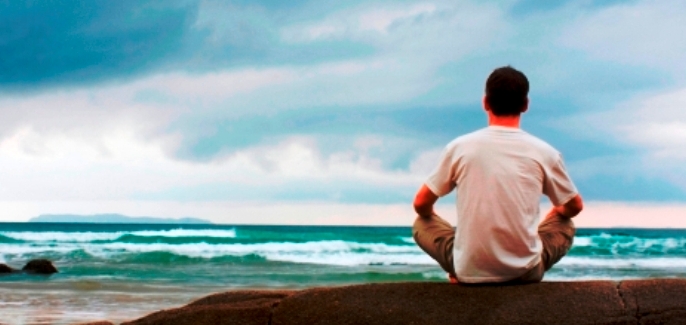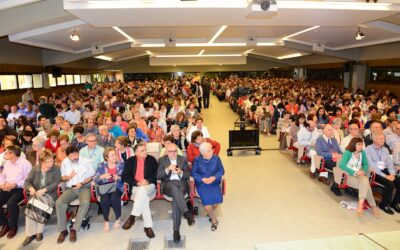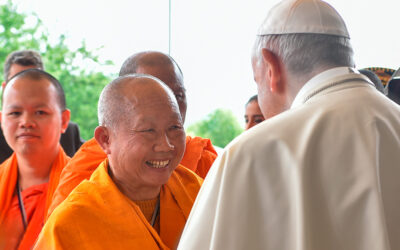 Praying does not consist specifically in dedicating time to meditation during the day, or in reading some passages of the Holy Scriptures or the writings of saints, and in trying to think of God or of ourselves for our own interior renewal. This is not the essence of prayer. Neither is it only the recitation of the rosary or morning and evening prayers. These are certainly expressions that help us to come in contact with God and express this intimate reality, which however never coincides completely with it. At most, a person can do all this during the day and may not have even prayed for an instant. In fact, there’s a substantial difference between prayer and prayers, which I shall try to explain, starting from the prayer that is mostly unconscious, but not less essential because of this. When, at night, we look up to watch the starry sky, we see a universe of unending beauty which enchants and amazes us in its silent obedience to a law: the law of life and harmony which from the beginning created it and sustains it in every moment: This law alone testifies to the Creator. The same goes for the stars in the sky, and the plants and flowers that “know” when it is time to blossom, when to bear fruit and die. A profound rapport thus binds all living creatures to God, a relation that – I dare say – is also a profound prayer because, with their beings and their sole existence, they unconsciously recognise and follow that law, “narrating the glory.” (Psalm 18.2). But this hidden prayer finds its highest expression – because it is free and conscious – also in man. It is that prayer which arises when man, even before entering into a dialogue with God, acknowledges him as the Father who created and sustains his being, on par with the entire universe. The relationship with God therefore stands out in its reality as the vital and together healing fundament all in one. And so, a relationship which man is called to establish daily with him, or to request from him, as some masters of the spirit do, in an original interpretation of the Our Father: “Give us today our daily bread,” is the request. Prayer, in order to be such, firstly demands a relationship with Jesus: to go with him, in spirit beyond our human condition, our worries, our prayers, though beautiful and necessary, and establish this intimate relationship with him. […] Let us now see some other ways through which this relationship can develop. I shall start from a type of prayer which apparently may not seem to such, and this is the prayer of offering. This is experienced by those who, prostrated by physical or spiritual sufferings, are unable to do anything, even to speak, and who offer to God, even if for the span of just an instant, all their existence. This type of prayer may thus be considered as the deepest type, since it embeds the soul in that point where our contact with God is immediate and direct. But also work can assume the type of a prayer of offering. I am thinking particularly of those who, during the day, are overcome by physical fatigue, and are almost unable to gather the necessary energy to dedicate themselves to prayer. Well, also they, if in the morning place an intention to offer their day to God, will feel that they are living in a continual dialogue with him, and in the evening, in the silence of even a brief moment of reflection will find union with him. And in the end, this is what humanity today is particularly sensitive to, the fact that the entire universe and all that it does, can be transformed into an immense, unceasing prayer that lifts up to God. Pasquale Foresi, from “Luce che si incarna” ( “Incarnated Light ”)– Ed.Città Nuova, Rome 2014, p. 31-32-33.
Praying does not consist specifically in dedicating time to meditation during the day, or in reading some passages of the Holy Scriptures or the writings of saints, and in trying to think of God or of ourselves for our own interior renewal. This is not the essence of prayer. Neither is it only the recitation of the rosary or morning and evening prayers. These are certainly expressions that help us to come in contact with God and express this intimate reality, which however never coincides completely with it. At most, a person can do all this during the day and may not have even prayed for an instant. In fact, there’s a substantial difference between prayer and prayers, which I shall try to explain, starting from the prayer that is mostly unconscious, but not less essential because of this. When, at night, we look up to watch the starry sky, we see a universe of unending beauty which enchants and amazes us in its silent obedience to a law: the law of life and harmony which from the beginning created it and sustains it in every moment: This law alone testifies to the Creator. The same goes for the stars in the sky, and the plants and flowers that “know” when it is time to blossom, when to bear fruit and die. A profound rapport thus binds all living creatures to God, a relation that – I dare say – is also a profound prayer because, with their beings and their sole existence, they unconsciously recognise and follow that law, “narrating the glory.” (Psalm 18.2). But this hidden prayer finds its highest expression – because it is free and conscious – also in man. It is that prayer which arises when man, even before entering into a dialogue with God, acknowledges him as the Father who created and sustains his being, on par with the entire universe. The relationship with God therefore stands out in its reality as the vital and together healing fundament all in one. And so, a relationship which man is called to establish daily with him, or to request from him, as some masters of the spirit do, in an original interpretation of the Our Father: “Give us today our daily bread,” is the request. Prayer, in order to be such, firstly demands a relationship with Jesus: to go with him, in spirit beyond our human condition, our worries, our prayers, though beautiful and necessary, and establish this intimate relationship with him. […] Let us now see some other ways through which this relationship can develop. I shall start from a type of prayer which apparently may not seem to such, and this is the prayer of offering. This is experienced by those who, prostrated by physical or spiritual sufferings, are unable to do anything, even to speak, and who offer to God, even if for the span of just an instant, all their existence. This type of prayer may thus be considered as the deepest type, since it embeds the soul in that point where our contact with God is immediate and direct. But also work can assume the type of a prayer of offering. I am thinking particularly of those who, during the day, are overcome by physical fatigue, and are almost unable to gather the necessary energy to dedicate themselves to prayer. Well, also they, if in the morning place an intention to offer their day to God, will feel that they are living in a continual dialogue with him, and in the evening, in the silence of even a brief moment of reflection will find union with him. And in the end, this is what humanity today is particularly sensitive to, the fact that the entire universe and all that it does, can be transformed into an immense, unceasing prayer that lifts up to God. Pasquale Foresi, from “Luce che si incarna” ( “Incarnated Light ”)– Ed.Città Nuova, Rome 2014, p. 31-32-33.
Help each other in every way
Help each other in every way




0 Comments